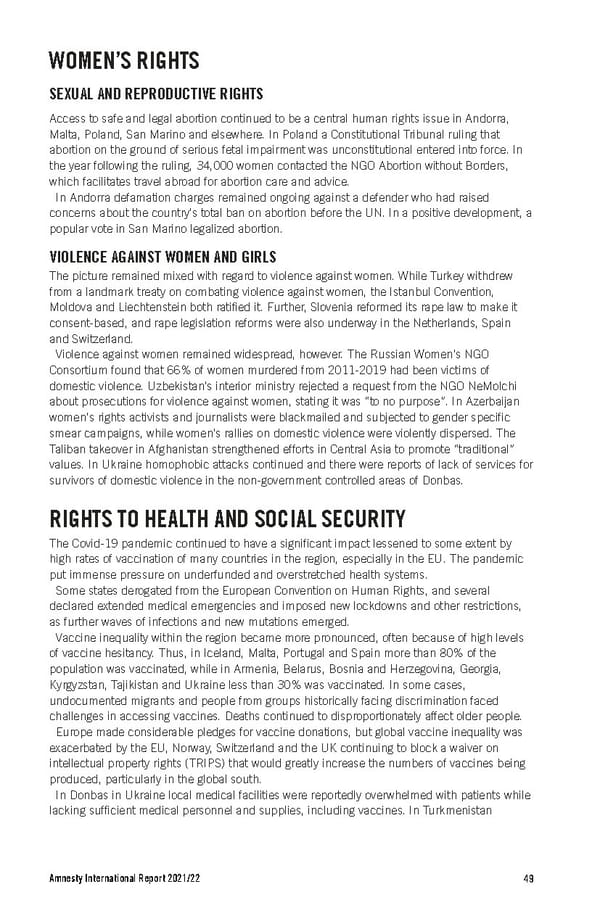WOMEN’S RIGHTS SEXUAL AND REPRODUCTIVE RIGHTS Access to safe and legal abortion continued to be a central human rights issue in Andorra, Malta, Poland, San Marino and elsewhere. In Poland a Constitutional Tribunal ruling that abortion on the ground of serious fetal impairment was unconstitutional entered into force. In the year following the ruling, 34,000 women contacted the NGO Abortion without Borders, which facilitates travel abroad for abortion care and advice. In Andorra defamation charges remained ongoing against a defender who had raised concerns about the country’s total ban on abortion before the UN. In a positive development, a popular vote in San Marino legalized abortion. VIOLENCE AGAINST WOMEN AND GIRLS The picture remained mixed with regard to violence against women. While Turkey withdrew from a landmark treaty on combating violence against women, the Istanbul Convention, Moldova and Liechtenstein both ratified it. Further, Slovenia reformed its rape law to make it consent-based, and rape legislation reforms were also underway in the Netherlands, Spain and Switzerland. Violence against women remained widespread, however. The Russian Women’s NGO Consortium found that 66% of women murdered from 2011-2019 had been victims of domestic violence. Uzbekistan’s interior ministry rejected a request from the NGO NeMolchi about prosecutions for violence against women, stating it was “to no purpose”. In Azerbaijan women's rights activists and journalists were blackmailed and subjected to gender specific smear campaigns, while women’s rallies on domestic violence were violently dispersed. The Taliban takeover in Afghanistan strengthened efforts in Central Asia to promote “traditional” values. In Ukraine homophobic attacks continued and there were reports of lack of services for survivors of domestic violence in the non-government controlled areas of Donbas. RIGHTS TO HEALTH AND SOCIAL SECURITY The Covid-19 pandemic continued to have a significant impact lessened to some extent by high rates of vaccination of many countries in the region, especially in the EU. The pandemic put immense pressure on underfunded and overstretched health systems. Some states derogated from the European Convention on Human Rights, and several declared extended medical emergencies and imposed new lockdowns and other restrictions, as further waves of infections and new mutations emerged. Vaccine inequality within the region became more pronounced, often because of high levels of vaccine hesitancy. Thus, in Iceland, Malta, Portugal and Spain more than 80% of the population was vaccinated, while in Armenia, Belarus, Bosnia and Herzegovina, Georgia, Kyrgyzstan, Tajikistan and Ukraine less than 30% was vaccinated. In some cases, undocumented migrants and people from groups historically facing discrimination faced challenges in accessing vaccines. Deaths continued to disproportionately affect older people. Europe made considerable pledges for vaccine donations, but global vaccine inequality was exacerbated by the EU, Norway, Switzerland and the UK continuing to block a waiver on intellectual property rights (TRIPS) that would greatly increase the numbers of vaccines being produced, particularly in the global south. In Donbas in Ukraine local medical facilities were reportedly overwhelmed with patients while lacking sufficient medical personnel and supplies, including vaccines. In Turkmenistan Amnesty International Report 2021/22 49
 Amnesty International Report 2021/22 Page 48 Page 50
Amnesty International Report 2021/22 Page 48 Page 50